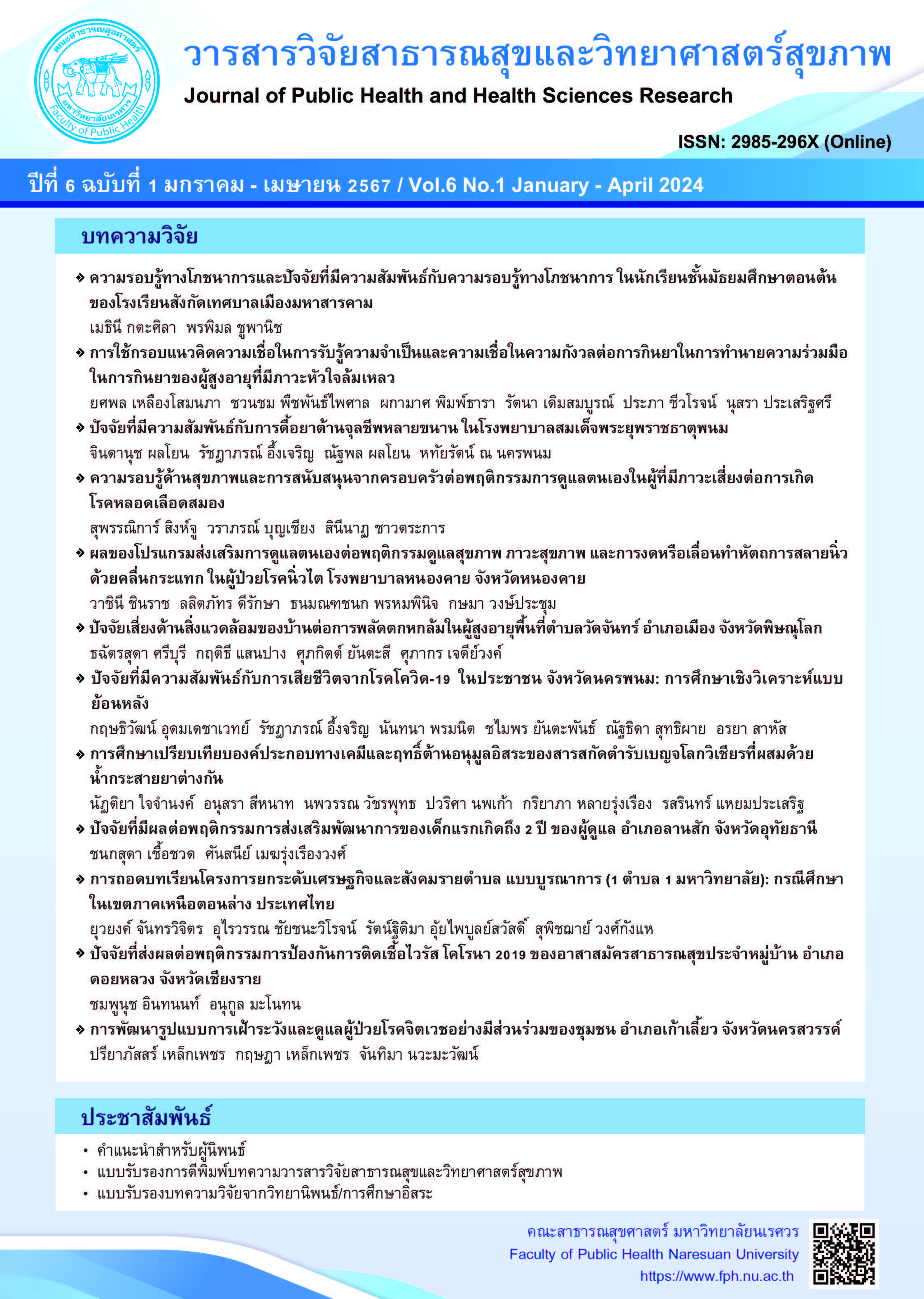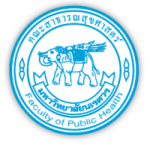Relations of health literacy and family support on self-care behaviors among people at risk of stroke
Keywords:
Family support, Health literacy, People at risk of stroke, Self-care behaviorsAbstract
This cross-sectional study aimed to investigate the relationships between health literacy and family support on self-care behaviors among people at risk of stroke. The samples consisted of 97 individuals at risk of stroke, aged 35-70 years old, who attended services at the outpatient department of Chiang Mai Neurological Hospital. The sample was selected using a convenience sampling technique. The data were collected by the questionnaires, including personal data, health literacy, family support, and self-care behaviors of the people at risk of stroke. The data were analyzed using descriptive statistics and Spearman's rank correlation coefficient.
The study results revealed as follows: Health literacy (Mean 27.90, S.D. = 5.90), family support (Mean = 77.65, S.D. = 11.67) and self-care behaviors (Mean = 41.55, S.D. = 7.31) in people at risk of stroke were overall at a high level. Health literacy had a positive correlation with self-care behaviors in people at risk of stroke at a moderate level with a statistical significance (r = 0.41, p-value < 0.001). The family support was not relevant to self-care behaviors in people at risk of stroke. These results represented that health literacy is an elemental for self-care behaviors in persons at risk of stroke. Therefore, healthcare providers should find the guidelines to promote health literacy among persons at risk of stroke for their effective self-care behaviors and further stroke prevention.
References
Chotchai, T., SeeDaket, S., Teaarak, K., Panyasong, S., & Buajun, A. (2020). Factors related to health literacy in prevention of hypertension among group at risk in Samran Sub-Districk, Muang District, Khon Kaen Province. The Southern College Network Journal of Nursing and Public Health,7(1), 45-56. (in Thai)
Cobb, S. (1976). Social support as a moderator of life stress. Psychosomatic Medicine, 38(5), 300-314.
Conner, M., & Norman, P. (2017). Health behaviour: Current issues and challenges. Psychology & Health, 32(8), 895-906.
Daemayu, A., Panuthai, S., & Junasopeepun, P. (2020). Correlation between health literacy and self-management among older Thai muslims with hypertension. Journal of Thailand Nursing and Midwifery Council, 35(3), 87-107. (in Thai)
Darun, P., & Khanpijan, N. (2016). Factors affecting health literacy and health behavior outcomes of working-age population in Porncharoen District, Bueng Kan Province. The Office of Disease Prevention and Control 9 Nakhon Rathasima Journal, 22(1), 14-24. (in Thai)
Department of Health Service Support. (2018, March 25). Assessment health literacy and health behavior. Retrieved June 24, 2023, from http://www.hed.go.th/linkHed/333 (in Thai)
Duangpratoom, N., & Rattanakanahutanon, F. (2019). Factors associated to self-care behaviors of type 2 diabetes mellitus patients in HuaiKhamin Health Promoting Hospital, Dan Chang, Suphanburi Province. Valaya Alongkorn Review Humanities and Social Sciene, 9(2), 53-67. (in Thai)
Feigin, V. L., Brainin, M., Norrving, B., Martins, S., Sacco, R. L., Hacke, W. et al. (2022). World Stroke Organization (WSO): Global stroke fact sheet 2022. International Journal of Stroke, 17(1), 18-29.
Fields, B., Lee, A., Piette, J. D., Trivedi, R., Mor, M. K., Obrosky, D. S. et al. (2021). Relationship between adult and family supporter health literacy levels and supporter roles in diabetes management. Families, Systems, & Health, 39(2), 224-233.
Gawulayo, S., Erasmus, C. J., & Rhoda, A. J. (2021). Family functioning and stroke: Family members' perspectives. African Journal Disability, 10(0), a801. https://doi.org/10.4102/ajod.v10i0.801
Ishikawa, H., & Kiuchi, T. (2019). Association of health literacy levels between family members. Frontiers in Public Health, 7, 169. https://doi.org/10.3389/fpubh.2019.00169
Jitapunkul, S., Kamolratanakul, P.,& Ebrahim, S. (1994). The meaning of activities of daily living in a Thai elderly population: Develop of a new index. Age Ageing, 23(2), 97-101.
Jodnok, K., & Panomai, N. (2019). Factors influencing stroke prevention self-care behavior at Buengkan Hospital, Buengkan District, Buengkan Province. North-Eastern Thai Journal of Neuroscience, 13(2), 38-55. (in Thai)
Kaewtong, N., Termsirikulchai, L., Leelaphan, P., Kengganpanich, T., & Keawdumkoeng, K. (2014). Health literacy of group at risk of hypertension at Ban Nonghoi Sub-District Health Promoting Hospital, Sa Kaeo Province. Journal of Boromarajonani College of Nursing, Bangkok, 30(1), 45-56. (in Thai)
Kareesun, K., Malathum, P., & Sutti, N. (2019). Relationships among health literacy, knowledge about hypertension control, and health behavior in older persons with hypertension. Ramathibodi Nursing Jounal, 25(3), 280-295. (in Thai)
Krainatee, M., Dhammasaccakarn, W., & Sungkharat, U. (2020). Family: The social key institutions and roles of holistic human development. Parichart Journal Thaksin University, 33(1), 1-16. (in Thai)
Kummmak, S. (2016). Self-care behaviors among hypertension patients in Nanglao Sub- District Health Promoting Hospital, Satingpha District, Songkhla Province. The Southern College Network Journal of Nursing and Public Health, 3(3), 153-169. (in Thai)
Liu, Y. B., Liu, L., Li, Y. F., & Chen, Y. L. (2015). Relationship between health literacy, health-related behaviors and health status: A survey of elderly chinese. International Journal of Environmental Research and Public Health, 12(8), 9714-9725.
Ministry of Public Health. (2017). 5-year national NCDs prevention and control strategic and action plan (2017-2021). Nonthaburi: Bureau of Non-Communicable Disease, Ministry of Public Health. (in Thai)
Ministry of Public Health. (2020). Public health statistics 2020. Nonthaburi: Ministry of Public Health. (in Thai)
Noppakraw, J., Chintanawat, R., & Khampolsiri, T. (2020). Health literacy andself-management in older persons with type 2 diabetes mellitus. Nursing Journal, 47(2), 251-261. (in Thai)
Nutbeam, D. (2000). Health literacy as a public health goal: A challenge for contemporary health education and communication strategies into the 21st century. Health Promotion International, 15(3), 259-267.
Orem, D. (1985). Nursing: Concepts of practice. New York: McGraw-Hill Book Co.
Pawan, V., Boonchuaythanasit, K., Ponrachom, C., & Sukopuk, M. (2017). Perception of information, knowledge and protecting behavior of diseases and health hazard of Thai citizens in 2016. Journal of Health Science Research, 11(1), 70-79. (in Thai)
Photihung, P. (2021). Relationship of health literacy to health promoting and disease prevention behaviors in Thailand: A systematic review. The Journal of Faculty of Nursing Burapha University, 29(3), 115-130. (in Thai)
Polit, D. F. & Beck, C. T. (2004). Nursing research: Principles and methods. (7th ed.). Philadelphia: Lippincott Williams & Wilkins.
Pongkumpa, L. & Himananto, S. (2017). Knowledge and self-care behavior among type 2 diabetes living in Bangsai, Maung, Chonburi Province. HCU Journal of Health Science, 20(40), 67-76. (in Thai)
Schaefer, C., Coyne, J. C., & Lazarus, R. S. (1981). The health-related functions of social support. Journal of Behavioral Medicine, 4(4), 381-406.
Silangirn, P. (2017). Factors related to self-care behaviors among elderly of Phayao Province. Thesis of Master of Public Health in Health Promotion Management, Thammasat University, Bangkok. (in Thai)
Sonsuk, J., & Khamwong, P. (2018). The influence of perceived severity, health literacy, and family support on self-care behavior to prevent knee osteoarthritis in elderly. Lanna Public Health Journal, 14(2), 36-45. (in Thai)
Srison, P., Hachauck, W., Ratchapakdee, P., & Uppasarn, W. (2019). Health literacy and self-care behavior among post valvular heart surgery patients. Journal of Nursing Association of Thailand Northern Region, 25(1), 1-13. (in Thai)
Srisuksai, N. (2013). Relationshiop between family function and perceived family support with diabetes mellitus in Banpong District, Ratchaburi Province. Nursing Journal of the Ministry of Public Health, 23(1), 60-69. (in Thai)
Suriya, J., Aungwattana, S., & Suankaew, S. (2020). Social support and health behavior of the elderly of club of Sungmen District, Phrae Province. Nursing Journal, 47(3), 267-276. (in Thai)
Tasuwanin, T., Manotham, M., Maneerat, W., Muangmool, J., & Phanwong, W. (2020). Self-care behaviors when illness and social support among Karieng elderly people at Ban Karieng Ruammit, Muang District, Chang Rai Province. Journal of Nursing and Health Care, 38(2), 158-167. (in Thai)
Tiamkao, s. (2019). Diabetes and stroke. Thai Journal of Neurology, 35(4), 59-71. (in Thai)
Trainattawan, W., Wirojratana, V., & Watanakukrailert, D. (2019). Factors influencing health literacy among older adults. Journal of Health Science Research, 13(2), 41-51. (in Thai)
Tubsee, S. (2020). Factors related to self-care behavior of the elderly in Kangkrajan District, Phetchaburi Province. Journal of Prachomklao Collage of Nursing Phetchaburi Province, 3(1), 14-30. (in Thai)
Wittink, H., & Oosterhaven, J. (2018). Patient education and health literacy. Musculoskeletal Science & Practice, 38, 120-127.
World Health Organization. (2022, June 1). Health literacy development for the prevention and control of noncommunicable diseases: Volume 3. Recommended actions. Retrieved June 24, 2023, from https://www.who.int/publications/i/item/9789240055377
Ritthichai, Y., & Pongsathonviboon, K. (2022). The effect of a perceived health beliefpromoting program combined with a mobile application on preventive behaviors in young adults at risk of stroke. Journal of The Police Nurses, 14(2), 254-267. (in Thai)
Zinat Motlagh, S. F., Chaman, R., Sadeghi, E., & Eslami, A. A. (2016). Self-care behaviors and related factors in hypertensive patients. Iranian Red Crescent Medical Journal, 18(6), e35805.doi:10.5812/ircmj.35805.
Downloads
Published
How to Cite
Issue
Section
License
Copyright (c) 2024 Journal of Public Health and Health Sciences Research

This work is licensed under a Creative Commons Attribution-NonCommercial-NoDerivatives 4.0 International License.
The published article is copyrighted by the Journal of Public Health and Health Sciences Research.
The statements that appear in each article in this academic and research journal are the personal opinions of each author and are not related to Naresuan University and other faculty members in the university. Responsibilities regarding each article are the responsibility of each author.






